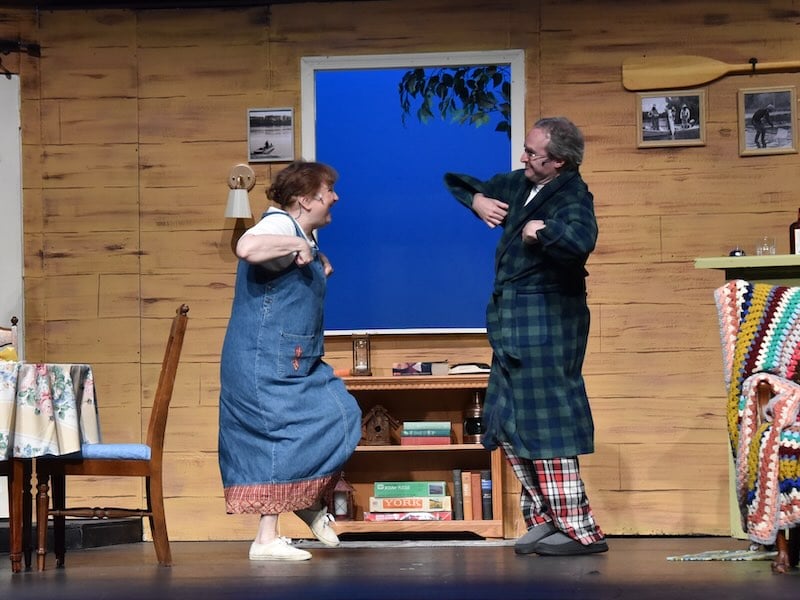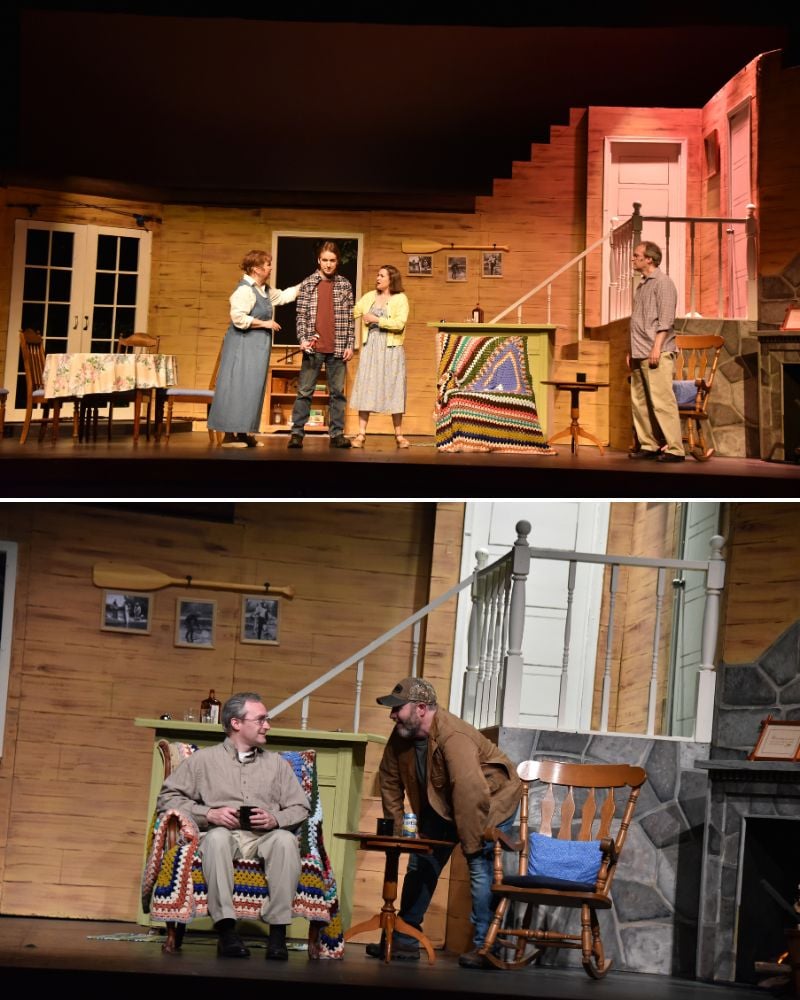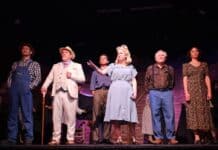The Foreigner is utterly charming.
Larry Shue’s delightful 1985 comedy introduces Charlie, a hopelessly shy and tongue-tied British science-fiction proofreader convinced he is terminally boring. Brought to a rustic fishing lodge in rural Georgia by his hearty soldier friend Froggy for a break from his (supposedly) dying wife’s bedside, he has a panic attack that he might actually have to converse with anyone. Froggy says he’ll fix it, and proceeds to tell the proprietress Betty and the other residents of the lodge that Charlie is “a foreigner” who doesn’t speak a word of English, so there’s no use talking to him. Rather than not talking to him, everyone in the house proceeds to spill all their secrets either in front of him or to him, assuming he can’t understand. Charlie begins to realize some people at the lodge have nefarious plans that threaten the others. Also, relieved of the pressure of engaging in conversation, and taking the lead from the assumptions others make of him, he begins to “acquire a personality” — losing his inhibitions and setting his silly and dramatic side free, earning the admiration and affection of some of the residents.
Although being mounted in the JCC in Rockville while its home theater, the F. Scott Fitzgerald, is undergoing renovations, Rockville Little Theatre’s show has top-notch production values.

Director Kathryn Stirling keeps the whole show running like a well-oiled machine while also keeping the sweetness and humor flowing. Her double-level set design (constructed by William Kolodrubetz, assisted by David Hegewood) is solid and appropriate, with a large entrance door, practical lighting, staircase, cellar trap door, excellent “working” fireplace, and appropriate-looking pine-clad walls (painted by Katherine Rogers). Filip Bastos’ lighting design makes good use of the cyclorama that rises behind the set to show different weather and times of day (although in a portion of the show where the electricity is supposed to be out, the set still appears fully lit). Aaron Skolnick’s sound design is well done, with the actors easily heard and clear — in fact, at times, actors who are offstage, supposedly calling from other rooms, are just as loud as the ones in view, and a few times, actors’ voices are magnified by other actors’ mics. Also, although the sound of rain and thunder is very effective opening the show, it feels a bit awkward to simply have the rain shut off when the action begins. If the rain was timed to start and then drop down or out when the doors open and close, that would be one thing, but the sound seems to stop arbitrarily.) Tongjia (Tonya) Fu’s props were suitable, including a 1980s-appropriate phone and some sticks of dynamite and a detonator that looked so gleefully cartoonish they should have “ACME” written on them. Laura Andruski’s costumes fit the bill, particularly Betty the innkeeper’s denim jumpers and including the unfortunate collection of KKK robes. There might have been more clues in her clothes that Catharine is a spoiled debutante. She seems a bit too down-to-earth here to be a Dallas-era heiress, even if she is in the boondocks. Natalie McManus’ dialect coaching is terrific, ranging from various social levels of British English to Southern American dialects to — well, you’ll just have to see the play to find out what else.
The actors that benefit from all this technical expertise are equally fine. Nathan Chadwick is perfectly awful as the villain Owen Musser, keeping his vile nature in check with great difficulty and indulging his sadistic streak whenever he gets the chance. His forced reveal of the cowardly side of the bully is very satisfying. Nicholas (Nick) Martinez plays well David Lee, the saccharine preacher with a secret side, making his final transformation showing his true colors very effective. Whitney Johnson, as his conflicted fiancée Catharine Simms, spends most of the first act expressing frustration, but when she finds in Charlie someone to talk to (or at), her softer, more thoughtful side begins to shine through. Sam Kuhr’s Ellard Simms, her brother who may or may not be quite as dumb as he seems, is comic gold in both rapid-fire dialogue and physical hijinks. Joan Crooks, as the sweet, tired lodge owner Betty Meeks, who has never been out of her mountain town, bounces between folk wisdom and gullible naiveté at breakneck speed, but always with good-natured, wide-eyed enjoyment. Brad Van Grack’s “Froggy” LeSueur, the hearty Limey demolition sergeant, chugs along in the best humor — until he starts to get jealous of all the attention that his friend is getting from his plan. Astonishment, sympathy, and annoyance are equally at home on his gruff but always friendly face.

And above all shines the performance that the rest of the play revolves around, Tristan Poje’s “foreigner,” Charlie Baker. Poje’s soft, posh accent and shy, hangdog character are so well done that it is almost a shame that he doesn’t get to indulge in them more. But almost immediately, he begins to ring the emotional changes from mortally embarrassed, through blandly oblivious (with flashes of anger and disgust when he learns some people’s secrets), through “quick learner of English” when he realizes he has to begin communicating, to exciting raconteur, to full-fledged, scene-stealing hero. Charlie’s blank smile when he “realizes” he is being spoken to, and his foreign-sounding “thank you!” to anything said to him, are a delight. His “foreign tongue” is hysterical. His “telling a story in his native language” is a comic tour de force of physical comedy, timing, mime, and expression of emotion and narrative without intelligible words. There is more than a hint of Monty Python physicality in his performance. (Apparently, the “language” he speaks is a crazy amalgam of Russian, German, and several other languages, written out in the script but only partly “translated.” So the actor playing Charlie has to learn the lines phonetically, but also to come up himself with the story he is telling — a tall order that Poje fills beautifully.) And the best thing about Poje’s portrayal is the genuine sweetness in his nature as he finds his true personality and voice — through a made-up character and language. Charlie is simply, genuinely adorable.
It is almost a shame that the schemes of the villains in the piece should have to interrupt the sublime, sweetly silly story of Charlie emerging from his shell. But presumably, to progress, the plot needed villains, and perhaps in 1985 the Ku Klux Klan were seen as a distant enough threat to be used as antagonists in a comedy. It is quite satisfying here to see them get their comeuppance, especially in a way that allows Charlie to be the hero he never dreamed he could be, and the play to convey a message of tolerance, understanding, and communication from the heart.
The Foreigner is a charming comic delight.
Don’t miss it.
Running Time: Approximately two hours including intermission.
The Foreigner plays through May 4, 2025 (Friday and Saturday evenings at 8 pm, Sundays at 2 pm), presented by Rockville Little Theatre performing the Bender Jewish Community Center, 6125 Montrose Road, Rockville MD. Tickets ($22; $20 for students and seniors) may be purchased online, by emailing tickets@rlt-online.org, or by calling the box office at 240-314-8690 from 2-6 Tuesday through Friday and from 10-2 on Saturday.
The cast and creative credits are online here.
The Foreigner contains prominent displays of racism and depicts racist language and actions that, while integral to the story, are disturbing.
The Foreigner
By Larry Shue
Directed by Kathryn Stirling
COVID Safety: Masks optional.



